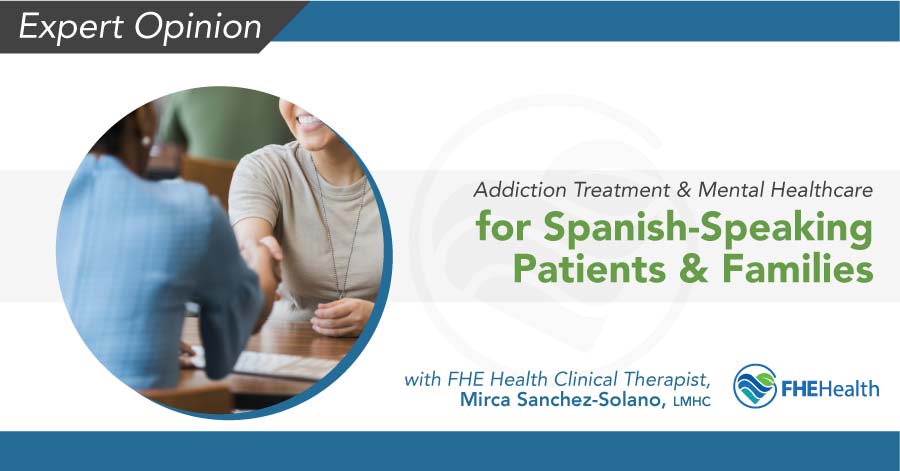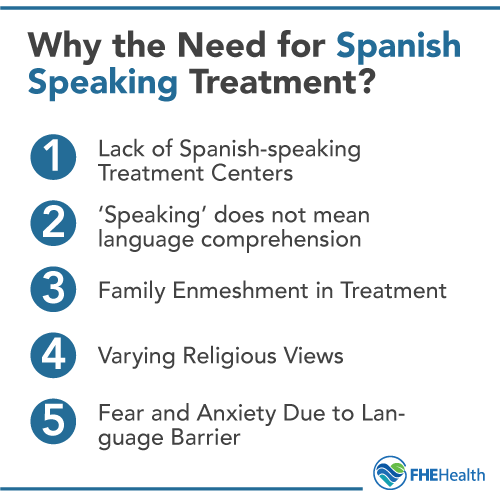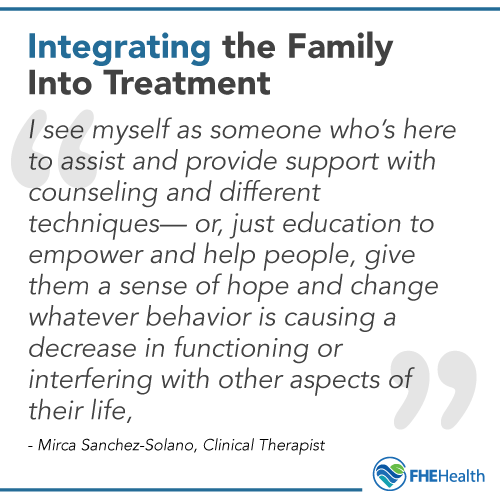
This article has been reviewed for accuracy by our peer review team which includes clinicians and medical professionals. Learn more about our peer review process.
Because of its location in South Florida, FHE Health is accustomed to working with Spanish-speaking patients and/or families. While the treatment needs of this demographic are quite similar to those of the broader population—anxiety, depression, PTSD, substance abuse and suicide occur at similar rates within the Latino community, for example, according to a National Alliance on Mental Illness (NAMI) report—the language barrier can be an added obstacle to accessing much-needed treatment.
The same NAMI report noted that “approximately 33 percent of Latino adults with mental illness receive treatment each year compared to the U.S. average of 43 percent,” and that “without treatment, certain mental health conditions can worsen and become disabling.” That disparity means Spanish speakers with behavioral health problems are more vulnerable and in critical need of Spanish-speaking treatment.
Language and Cross-Cultural Barriers in Healthcare
As a native Spanish speaker and therapist at FHE Health, Mirca Sanchez-Solano can speak with firsthand authority about how language barriers impact patient care and why foreign language in the medical field is critical to helping patients. Sanchez-Solano regularly interfaces with our Spanish-speaking patients and/or their families. In a recent interview, she shared about her role and some of the unique challenges of providing Spanish language addiction treatment and mental healthcare.
Because of her fluency in Spanish and her cross-cultural ease in working with Latino populations, Sanchez is called into situations where a patient and/or their family needs or requests Spanish-speaking help. (Sanchez, whose family is from the Caribbean, grew up speaking Spanish at home.)
Why There’s a Need for Spanish-Speaking Treatment
 Sanchez named a number of language and cross-cultural barriers that can get in the way of treatment and can keep people from seeking behavioral healthcare in the first place. Examples of such barriers included the following:
Sanchez named a number of language and cross-cultural barriers that can get in the way of treatment and can keep people from seeking behavioral healthcare in the first place. Examples of such barriers included the following:
- A lack of Spanish-speaking treatment centers – While Sanchez acknowledged that “because I speak Spanish, I may be biased,” she opined that “in places like South Florida or New York where there are large Spanish-speaking populations, there needs to be more accessibility for people from different backgrounds to be able to seek treatment.” Why? Because “it’s easier for a client or family to seek treatment if they can talk to someone who is familiar and knows their mother tongue … we tend to gravitate to what we find familiar.”
- Limited comprehension of English, even if a person/family speaks English – “If I’m seeking treatment and may speak English, there still are a lot of things I’m not going to understand,” Sanchez explained. “Who is going to explain my treatment plan or the consent form? You’ll get a lot of people who will speak the language but don’t know how to understand it.”
- Family enmeshment and other dynamics – Sanchez said this happens a lot, because for many Spanish-speaking people, “family is everything … so “there’s more of a chance for families to be over-involved, which can be a detriment to the client.” Some families will be “more modern and up with the times and will incorporate more American values, but when you grow up in a family that’s not as progressive it can be a problem for the therapist when you’re building [a patient’s] independence … you can imagine that a client who has to set boundaries with their mom— it can pose a problem.” Sanchez added that many families have the notion that “you resolve things within the family,” so that the notion of seeking outside help is shunned.
- Religious views – Like the primacy of family, certain religious views can present barriers to treatment. One of these is the misguided notion that you can “pray away” an addiction or mental health issue, Sanchez said, who observed that this view can pose barriers to treatment if “it’s a heavily religious household.”
- Fear because of an inability to understand the language – And, while it may go without saying, if you don’t understand English while you are being admitted to treatment or your child is being asked to sign a consent form that they don’t understand, you will feel afraid, and often afraid enough to avoid treatment altogether. This reality was one that Sanchez was quick to confirm.
The Role of the Spanish-Speaking Therapist in Helping Patients and Families – What to Look for in a Spanish Treatment Center
 Sanchez has worked closely with both patients and families for whom English is a second language. She views her role as a bilingual therapist as primarily one of “education when it comes to the family and the client … that’s usually where I steer my focus, maybe because I know how Hispanic families work—because I grew up in one—so education is the key. I can’t make anybody comprehend, but that’s one of the things I drive as much as possible with the family.”
Sanchez has worked closely with both patients and families for whom English is a second language. She views her role as a bilingual therapist as primarily one of “education when it comes to the family and the client … that’s usually where I steer my focus, maybe because I know how Hispanic families work—because I grew up in one—so education is the key. I can’t make anybody comprehend, but that’s one of the things I drive as much as possible with the family.”
That education process can begin early in the admissions process. With families who request her help or clearly need it, Sanchez is there to help answer questions about the consent form and treatment plan and explain any issues or concepts that need translation. For example, she educates families about the importance of group and individual therapy and staying in touch with staff and therapists and what that may look like.
“It boils down to just educating and letting them know that I’m here to explain to them what this means,” Sanchez said.
Support Services for Spanish-Speaking Families
Sanchez will also facilitate family sessions, whether in-person or over the phone. For example, in one case where the patient could speak English and her mother could not, Sanchez was able to do a face-to-face family session in both Spanish and English. Often, though, her interactions with Spanish-speaking families will be over the phone: “[Families] want to be included, and I try to make them feel as included as possible while protecting patient confidentiality,” Sanchez said.
“I see myself as someone who’s here to assist and provide support with counseling and different techniques— or, just education to empower and help people, give them a sense of hope and change whatever behavior is causing a decrease in functioning or interfering with other aspects of their life,” Sanchez said.
Are you looking for Spanish addiction and/or mental health treatment? FHE Health can help.






